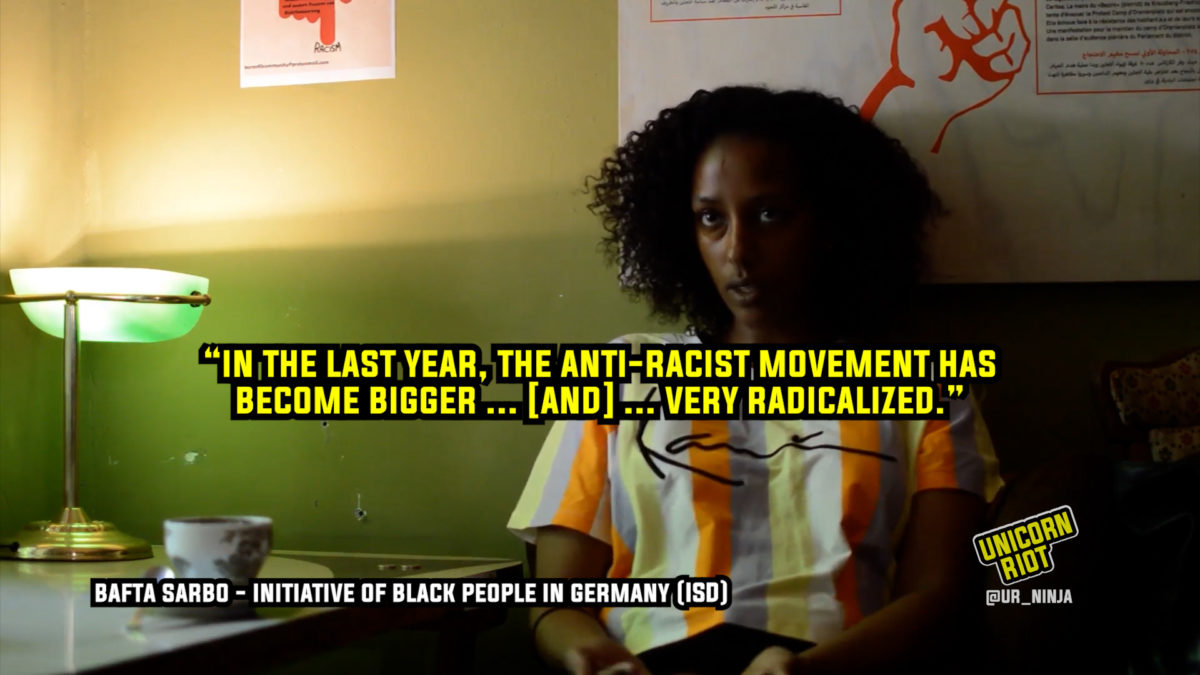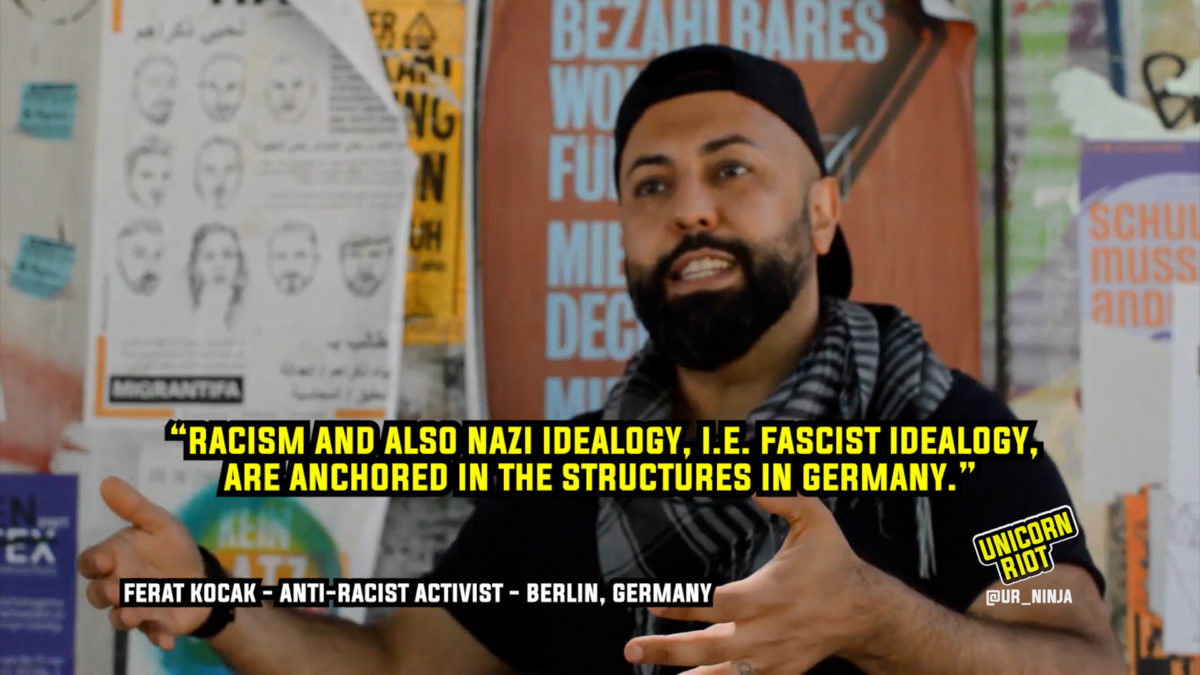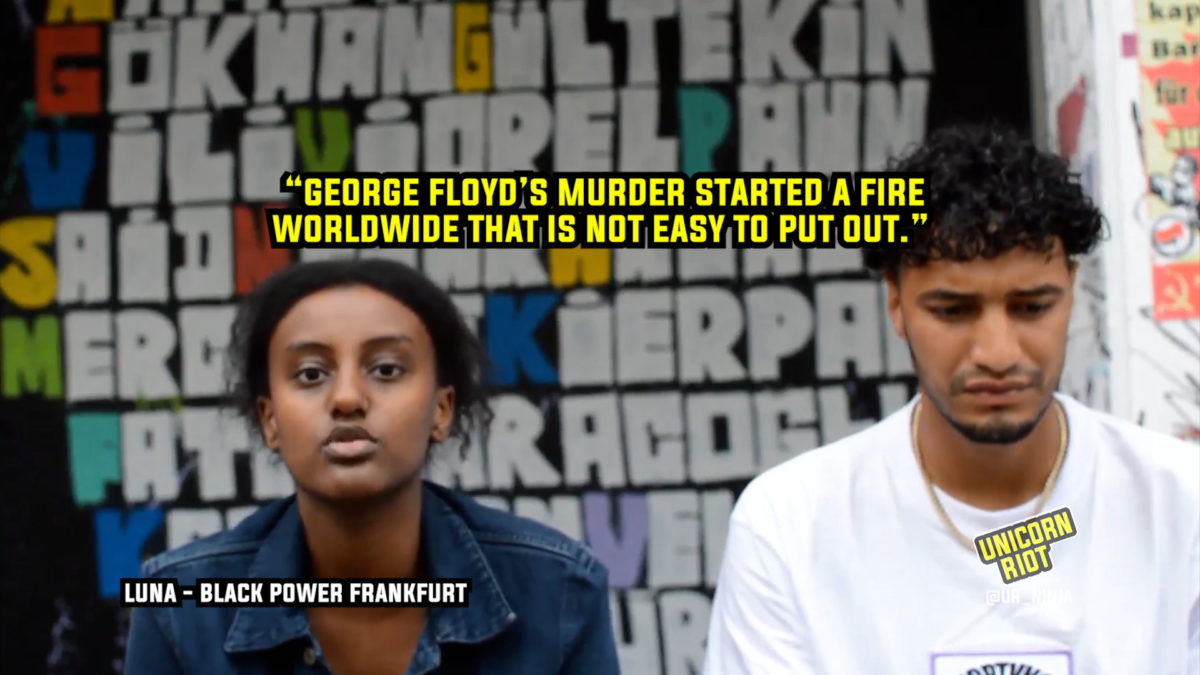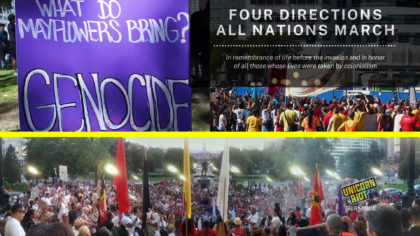One Year After George Floyd in Europe: The Deep Roots of Racism in Germany [Video]
The First Publication in a Contributed Series Titled ‘One Year After George Floyd: A Global Perspective’
In June 2021, Unicorn Riot went to Frankfurt and Berlin, Germany to show what impact the murder of George Floyd had in European countries. Germany is significant because it had the second biggest Black Lives Matter mobilizations in the world following the death of George Floyd.
While in Germany, Luna and Jackson from Black Power Frankfurt, Bafta Sarbo from Initiative of Black People in Germany (ISD), and Ferat Kocak an anti-racist activist, gave us valuable insight into the German reality and why a movement focusing on Black lives is of enormous importance.
Part Two – One Year After George Floyd in Europe: Afro-Greeks and African Migrants Speak Out [Videos]
The four spoke about German colonialism, Germany’s Nazi past and present, the far right scandals in the German ‘security’ forces, racist police practices, the impacts of George Floyd’s murder, as well as the new generation fighting institutional racism in Germany.



Transcript
Luna (Black Power Frankfurt): It’s hypocritical. It is not as honest as other states.
Ferat Kocak (anti-racist activist in Berlin, Germany): Immigrant’s stores with huge swastika markings.
Ferat: I think it’s because we have a huge problem within the security agencies here in Germany.
Bafta Sarbo (Initiative of Black in Germany): Black people have been living in Germany for 400 years and they are part of German history. But this history was also erased to a certain extent by the Nazis. There were many Black organizations in Germany. There were Black communists who organized themselves anti-colonially in the 20s. But these organizations were all crushed in the 30s. And these people had to leave Germany. I think it’s important for Germany to recognize and understand its Black German history. There were Black philosophers at German universities in the 19th century. A lot of people don’t even know that. Or how many Black people lived in Berlin and also in Hamburg. But even this presence cannot be separated from its connection with Germany’s colonial history.
Ferat Kocak: Germany also has a colonial past, but it has never come to terms with it, because Germany has always focused very strongly on National Socialism and the Holocaust. In their remembrance culture, reappraisal culture, everything that preceded is lost.
Luna: When it comes to German racism, you can never leave out colonialism. And recently there was a so-called reconciliation agreement between Germany and Namibia, where the affected communities of the first genocide in the 20th century were just completely left out and nobody was invited in the negotiations. And they are now fighting for reparations. It is a story that is completely hushed up and covered up. A genocide that no one talks about. Especially the agreement is an attempt to distract from Germany’s racism, to distract from the mockery of the victims and to pretend to be progressive and to do something. But in the end they push development aid, neocolonial development aid and refuse true reparations.
Ferat: We always say that after 1945 there was no denazification. More than two million NSDAP members and tens of millions of voters in these inhuman politics did not leave after ’45, but they grew back into the structures in the new Germany. And this ideology has grown in. This means that racism and also Nazi ideology, i.e. fascist ideology, are anchored in the structures in Germany, even if they are perhaps not always completely obvious. The federal domestic intelligence agency was >rebuilt as well in the tradition of National Socialism with people who were in the SS, who were in Hitler’s Secret Service. So the federal domestic intelligence agency in Germany also has a very concrete racist, anti-Semitic, National Socialist past and also the security authorities as a whole, i.e. also the German Army, did not come into being out of nothing, so to speak. We notice this again and again, that we very often have scandals within the security authorities, that ammunition is lost by security officers and the Army and is suddenly found in the possession of Nazis. There are chats where police officers of very high rank exchanging fascist words and symbols, racist words and symbols about refugees. In Neukölln we have right-wing terror for 11 years. Nazis terrorize people, activists, booksellers who organise readings on the subject of National Socialism. The church is often attacked because it supports refugees in Neukölln. People who stand up for feminist things, queer people, all those who are somehow active and do not fit into the worldview of neo-fascist Nazis, are attacked in order to intimidate them. At first you think okay, the Nazis are intelligent and can’t be caught. But then there are meetings of Nazis with police officers who are investigating the case. There is a prosecutor who was taken off because he is supposed to have told a prime suspect Nazi, he has nothing to worry about – He is on his side. Although the police and the security authorities know the offenders, they have also been wiretapping them for years, attacks take place again and again and recently also an attack on me, which my family and I only barely survived. And in my case, the police knew that I was being watched. These Nazis were bugged as they talked about how they now know where I live. And still I was not warned. And these scandals that are happening in Neukölln are happening all over Germany. We have NSU 2.0, where directly from a police computer, politicians, activists, lawyers have received threatening letters from Nazis. Their data was retrieved from police computers apparently.
Bafta: Since the 90s, there are about 181 cases of migrants, Black people, non-white people, who have died in police custody and it can be assumed that this custody was the central cause of death. Whether that’s people who committed suicide or were just driven into it by the detention circumstances, whether it’s people who were killed or people who were shot in the street and so on. That’s one of the campaigns that we worked on a lot last year. We, as the ISD (Initiative of Black People in Germany), also helped launch the campaign Death In Custody, which is about raising awareness of deaths that have occurred in state custody.
Luna: The German police are infused with Nazi networks that are out to terrorize non-white lives in Germany.
Jackson: Behind us are the names of the deceased from Hanau. It was a racially motivated right-wing attack in a town near here. Hanau is about 20 minutes or 30 minutes by train from here – 30KM or so. There you saw again that our brothers and sisters can be murdered and the state just looks the other way. There was apparently no possibility that evening according to official information, to reach the police. What in a city with probably 150,000 – 200,000 inhabitants that is actually more than just absurd.
Luna: The police are stationed 150 meters from the scene of the crime. They heard nothing, saw nothing on the night of the crime. No call went through, back doors were locked. The victims had no possibility to flee quickly.
Bafta: The police in Germany came into being primarily for counter-insurgency purposes, to put down the protests of the workers’ movements. In other words, to prevent left-wing mobilization, and police violence was always used very heavily, especially at demonstrations, because it was precisely about fighting uprisings and containing left-wingers who wanted to change society. Racist police violence has increased very strongly since the EU, because now with the European border regime, border controls have been abolished within Europe. So within the European countries you can now actually travel freely, but for that the borders have been generalized. So in trains, at airports, at train stations, etc., the police are now constantly checking people, who they think are in Germany illegally. So, when the police try to identify illegal migrants, they mainly approach non-white people, especially Black people. And they demand their residence papers, for example, to prove that they are legal. Racial profiling has mostly the function to control migration, to prevent migration and to identify people who have fled from African countries in order to put them in detention and deport them. At the Black Lives Matter demonstration last year, there were two Black boys in particular who were beaten up and injured very, very badly by the police. And these two then did an interview in Lower Class Magazine and one of them said that he grew up in Kreuzberg and then voluntarily moved to Marzahn. Marzahn is a district in Berlin where there are a lot of Nazis and Nazi attacks. He said he would rather live in Marzahn, where the Nazis are, than in Kreuzberg, where he can’t walk two meters without being constantly checked by the police. So he prefers to put up with the Nazi violence, because the police violence is also racist, but you can’t do anything against the police, he can’t protect himself against the police.
Ferat: When the murder of George Floyd happened last year, this anti-racist movement that formed after Hanau, strengthened even more. As a result very young people, who were not politicized at all, but were shocked by the fact that a policeman could murder someone on a racist basis, even if it was thousands of kilometers away, they took to the streets. And here in Berlin that was thousands or tens of thousands, I would even say. And also this protest was violently attacked by the police here in Berlin.
Bafta: I think we all didn’t expect that it would have this effect, because it’s not the first time that a Black person is killed by the police in the U.S. and there were also very many parallels to cases that happened before. We have also been working on racist police violence here in Germany for some time. And the kind of attention that this topic suddenly received is something that had never happened before. There had been a lot of demonstrations in which a lot of people have participated. Here in Berlin, there was a big march at Alexanderplatz, where there were about 80,000 people. I personally, I think, since I live in Berlin, there has never been such a big march, except for maybe “unteilbar”. So there was a very big wave of solidarity with the topic and there was also suddenly a very big awareness for the topic of racist police violence. I think last summer [2020] we all did more >than ever before. We gave a lot of interviews, wrote a lot of articles. We participated in panels. We’ve had street actions where we’ve addressed, for example, the colonial racist monuments. We’ve had, once again, the street festival for the renaming of Mond Street in Mitte. We’ve done campaign work. We’ve organized rallies in the streets over and over again and tried to take the message to the streets. We networked with various affected people and also with other communities that are also impacted by the same problem. Police violence doesn’t just affect Black people, but various communities in Germany. After last year, it wasn’t just George Floyd. It was generally a year of many political upheavals, where Hanau also happened, where a right-wing terrorist simply killed people, with the result that many Migrantifa (migrant antifascist) groups were
formed throughout Germany.
Luna: Black Power Frankfurt was formed last year in the wake of the Black Lives Matter protests, which were sparked by the murder of George Floyd in Minneapolis. George Floyd’s murder started a fire worldwide that was not easy to put out. There were huge mass mobilizations, led by Black people also in Germany. Germany had the second largest Black Lives Matter protests after the U.S. Which is very, very powerful, because all the time it’s made so invisible that there’s such a large African diaspora in Germany.
Jackson (Black Power Frankfurt): We formed [Black Power Frankfurt] barely a month after the murder of George Floyd. It was just a spontaneous meeting, after a demo. I would basically say that our group is relatively broadly diversified. the fact that we are all Black is of course our main link. But outside of it I wanted to say diverse, but yes we are very different people.
Luna: Everyone in it right? Teachers, pupils, workers, students.
Bafta: I noticed that in the last year the anti-racist movement has become bigger. But I also noticed that it has become very radicalized, that a lot of young people are not satisfied with a liberal anti-racism that demands equal rights, and that they are looking for more radical answers. There are now completely different debates, there is talk about police violence, it is no longer just talk about anti-discrimination measures, but that many are discussing how to abolish the police or reduce the powers of the police. And that many people are now talking about the connection between racism and capitalism and are striving for anti-capitalist organization, the organizations have also become much larger, etc. And I think that is a very positive development. I would say that this radicalization in the last year is also a product of social conditions, because I believe that it cannot be separated from the coronavirus pandemic and from the fact that many people who are not affected by racism have simply suffered in terms of material needs and that there is now a completely different solidarity and radicalism in the population as a whole.
Luna: As Black Power (Frankfurt), we also organized a large demonstration on May 22. On African Liberation Day, which is celebrated every year on May 20. It has a certain irony, in any case, because it is the anniversary of the death of a Black man who triggered mass protests by Black people and at the same time the historical date when Black people have been fighting for the unification of other Black people and for the unification of Africa since the 60s. It commemorates the anti-colonial organizing for African unity that created the African Union. And we see our work also in the continuity of those struggles globally. Because German imperialism is not only murdering our brothers and sisters here in detention centers or prisons, but also directly on Mother Continent [Africa]. And that’s how we would summarize its racism. It is murderous, it is institutional and it is designed to deceive people. Even though we didn’t see the big structural changes last year, a system remembers that so many people stood up. And many people will stand up again, people will fight back again. Because no one remains dumb and deaf in their oppression, we will again see suffering and especially Black suffering and then mobilizations will happen again. And it takes structures that can absorb them. It needs organizing and it needs people who think about long-term strategies, how we can eventually end our oppression. There is not really a coherent Black community in Germany and we have to build it up and first of all establish that there is a common struggle. So it’s often like that, I know it from my generation, from my parents and so on. Here, they were involved in ‘exile politics’ at most. The Sudanese come out when there’s something in Sudan, when there’s something with Ethiopia or Ghana or Nigeria last year. That’s right, and somehow our task as young people is to say, hey, we have a common enemy, imperialism. We have a common enemy, the police. So we have to organize, people, we have to come together. And for that, first of all, we need a space, a place where that can happen. And then you have to think further – What do we do? What actions do we take? What campaigns do we want to do? How do we get bigger? How can we grow? How can we make sure that, like last year, there are not only mobilizations, but also organizing?
Part Two – One Year After George Floyd in Europe: Afro-Greeks and African Migrants Speak Out [Videos]
Follow us on X (aka Twitter), Facebook, YouTube, Vimeo, Instagram, Mastodon, Threads, BlueSky and Patreon.
Please consider a tax-deductible donation to help sustain our horizontally-organized, non-profit media organization:



